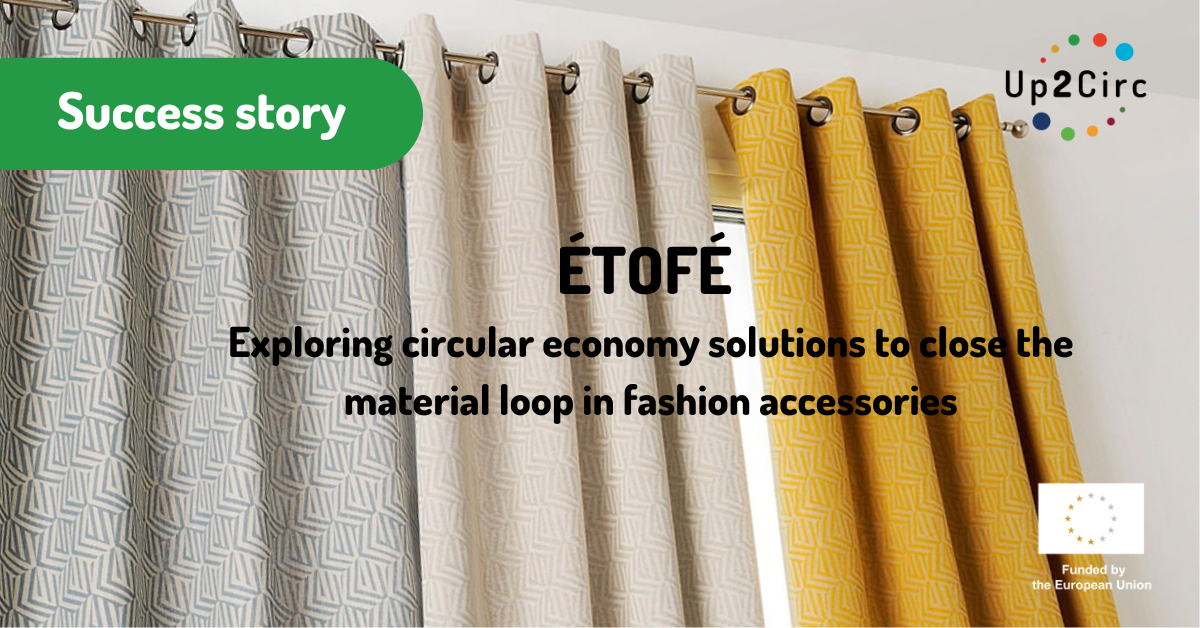
The ETOFE project aims to reduce textile waste from luxury hotels by offering to transform it into accessories.
COMPANY NAME
Solutions durables
COUNTRY
France
SECTOR
Textiles, Fashion Accessories
CIRCULAR BUSINESS MODEL
Upcycling luxury hotel textiles and integrating reclaimed leather with locally/EU-sourced consumables to design sustainable fashion accessories.
CHALLENGE
The fashion industry faces a double challenge:
- Large volumes of high-quality textiles are discarded when hotels refurbish their interiors, leading to unnecessary waste.
- Accessory production remains highly dependent on virgin, globally sourced consumables such as zippers, straps, and buckles, with little transparency in value chains.
ÉTOFÉ’s challenge was to reduce reliance on virgin and imported materials, while integrating reclaimed textiles and leather into consistent, market-ready products that meet both B2B and B2C requirements.
SOLUTION
ÉTOFÉ developed a local, circular supply chain combining:
- Recovery of luxury fabrics from 5-star hotels on the French Riviera.
- Collaboration with local artisans to reclaim leather offcuts, which are engraved with the brand logo and reintegrated as labels or reinforcements.
- Structured sourcing of zippers, buckles, sliders, straps, and labels from French and European suppliers to ensure traceability and reduce transport emissions.
- Production in local integration workshops, creating employment opportunities for people in professional reintegration.
CIRCULAR ECONOMY STRATEGIES/BUSINESS MODEL IMPLEMENTED
- Closing material loops: Reintegration of leather offcuts as branded labels and reinforcement elements.
- Reintegration of waste: Luxury hotel fabrics are recovered and transformed into new accessories.
- Eco-design: New prototypes (e.g., tote bag redesign) use fewer resources while improving functionality.
- Local sourcing: 100% French zippers and straps, European buckles, and locally engraved leather labels.
- Social inclusion: Products made in collaboration with rehabilitation and integration workshops.
- Business diversification: Products sold B2B (to donor hotels and boutiques) and B2C (to eco-conscious consumers).
IMPACT
Environmental impact
- 100% of textiles used are reclaimed hotel fabrics (approx. 3tons of waste diverted per year).
- Reclaimed leather offcuts replace textile labels, saving 100% of virgin label materials.
- Redesigned tote bag reduced strap length by 60% (from 2.5m to 1m), lowering virgin material use.
Economic impact
- Despite a 10–15% higher unit price for locally sourced consumables, overall costs were reduced through eco-design and material efficiency.
- The redesigned tote bag is now 10% more profitable while also cheaper for the end consumer.
- Investment in new equipment is shared 50/50 with the integration project, optimizing resources.
Social impact
- Collaboration with integration workshops provides employment and training opportunities for people re-entering the workforce.
- Partnerships with local artisans strengthen regional craftsmanship and knowledge-sharing.
- Local sourcing reinforces territorial economic activity and short supply chains.
KEY TAKEAWAY
ÉTOFÉ’s success story demonstrates how closing material loops and reintegrating reclaimed textiles and leather can create sustainable, profitable, and socially inclusive fashion accessories. By combining eco-design, local sourcing, and artisan partnerships, the brand proves that circularity is not only an environmental commitment but also a viable long-term business strategy.
